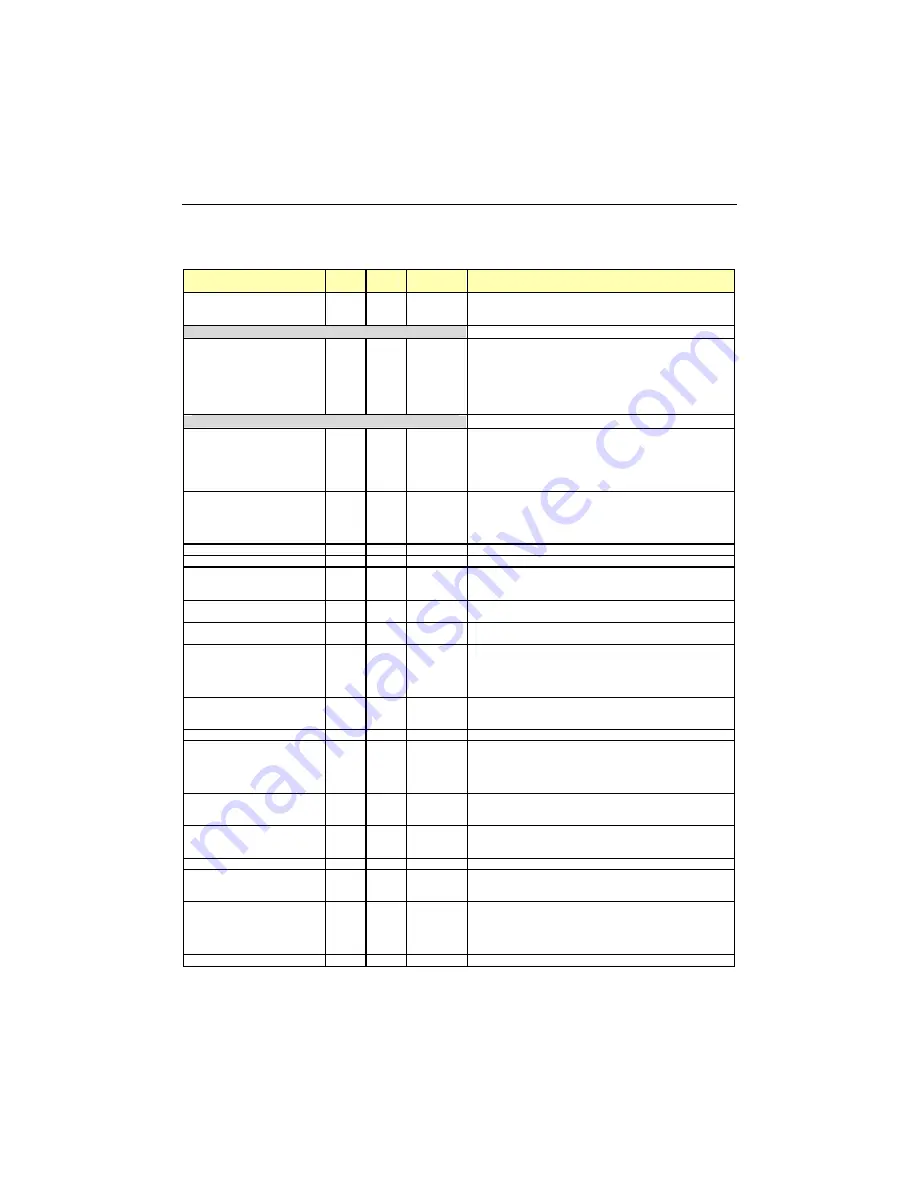
Software Setups
4-14
4.1.11 Integrated Peripherals
Option
BIOS
Defaults
Setup
Defaults
Possible
Settings
Description
On-Chip Primary/Secondary
En. En. En./Dis.
Select Enabled to activate the Primary/Secondary IDE
channel. The four options below appear only if the On-Chip
Primary option is enabled.
On-Chip Primary IDE
Master PIO
Slave PIO
Master UDMA
Slave UDMA
Auto Auto
Auto,
Modes
0-4
Use this option to set a PIO mode (0-4) for each of the
onboard IDE devices. Modes 0 through 4 provide successively
increased performance and speed. In Auto mode, the system
automatically determines the best mode for each device. If you
select a mode that the drive does not support, it may not work,
so choose a lesser value or Auto to see the best mode for the
drive.
On-Chip Secondary IDE
Master PIO
Slave PIO
Master UDMA
Slave UDMA
Dis. Auto
Auto,
Disabled.
Ultra DMA/33 implementation is possible only if your IDE hard
drive supports it and the operating environment includes a
DMA driver (Windows 95 OSR2 or a third-party IDE bus
master driver). If your hard drive and your system software
both support Ultra DMA/33, select Auto to enable BIOS
support.
IDE HDD Block Mode
Dis.
En.
En./Dis.
Block mode is also called block transfer, multiple commands,
or multiple sector read/write. If your IDE hard drive supports
block mode (most new drives do), select Enabled for automatic
detection of the optimal number of block read/writes per sector
the drive can support.
Onboard PCI SCSI Chip
En.
En.
En./Dis.
Enables/disables the onboard SCSI controller.
Ethernet Controller 1 and 2
En.
En.
En./Dis.
Enables/disables the onboard Ethernet controller.
USB Keyboard Support
OS
OS
OS/BIOS
This option is for DOS and BIOS support only (Win 95 has it is
own drivers).
It does not enable or disable the USB
controller.
PS/2 Mouse Function Control
Auto
Auto
Auto/Dis.
When set to Auto, the PS/2 mouse is automatically enabled, if
it is present.
Onboard FDC Controller
En.
En.
En./Dis.
Select Disabled to disable the onboard floppy disk controller
(FDC).
Onboard Serial Port 1
3F8/
IRQ4
3F8/
IRQ4
Dis,
3F8/IRQ4,
2F8/IRQ3,
3E8/IRQ4,
2E8/IRQ3
Select a COM port address and IRQ# for Serial Port 1
Onboard Serial Port 2
Dis
2F8
3F8,2F8,
3E8, 2E8
Disabled
Select a COM port address for Serial Port 2.
IRQ Line
3
3
3,4,5,7
Sets IRQ line for serial port 2
Onboard Serial Port 3
3E8/
IRQ4
3E8/
IRQ4
Dis,
3F8/IRQ4,
2F8/IRQ3,
3E8/IRQ4,
2E8/IRQ3
Select a COM port address and IRQ# for Serial Port 3
Serial Port 3 Mode
RS-232 RS-232
RS-232
RS-422
RS-485
Select the operation mode for Serial Port 3.
Onboard Serial Port 4
Dis
2E8
3F8,2F8,
3E8, 2E8
Disabled
Select a COM port address for serial port 4.
IRQ Line
3
3
3,4,5,7
Sets the IRQ line for serial port 4.
Onboard Parallel Port
378/
IRQ7
378/
IRQ7
Select a LPT address and IRQ# for the physical parallel
(printer) port. Possible settings are:
Disabled, 3BC/IRQ7, 378/IRQ7, 278/IRQ5,
Parallel Port Mode
ECP
+
EPP1.9
ECP
+
EPP1.9
Select an operating mode for the onboard parallel port. Select
ECP or EPP unless you are certain both your hardware and
software does not support ECP or EPP mode.
Possible settings are SPP, EPP1.9+SPP, ECP, ECP+EPP1.9,
Normal, EPP1.7+SPP, ECP+EPP1.7
ECP Mode Use DMA
3
3
1, 3
Select a DMA channel for the parallel port.
Artisan Technology Group - Quality Instrumentation ... Guaranteed | (888) 88-SOURCE | www.artisantg.com






























